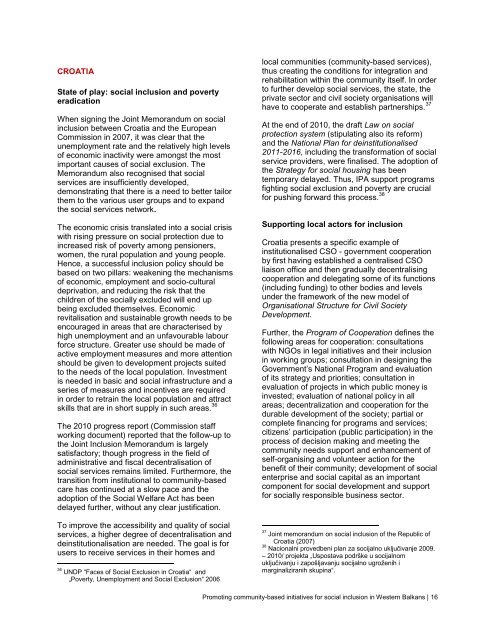Promoting community-based initiatives for social inclusion ... - Solidar
Promoting community-based initiatives for social inclusion ... - Solidar
Promoting community-based initiatives for social inclusion ... - Solidar
Create successful ePaper yourself
Turn your PDF publications into a flip-book with our unique Google optimized e-Paper software.
CROATIA<br />
State of play: <strong>social</strong> <strong>inclusion</strong> and poverty<br />
eradication<br />
When signing the Joint Memorandum on <strong>social</strong><br />
<strong>inclusion</strong> between Croatia and the European<br />
Commission in 2007, it was clear that the<br />
unemployment rate and the relatively high levels<br />
of economic inactivity were amongst the most<br />
important causes of <strong>social</strong> exclusion. The<br />
Memorandum also recognised that <strong>social</strong><br />
services are insufficiently developed,<br />
demonstrating that there is a need to better tailor<br />
them to the various user groups and to expand<br />
the <strong>social</strong> services network.<br />
The economic crisis translated into a <strong>social</strong> crisis<br />
with rising pressure on <strong>social</strong> protection due to<br />
increased risk of poverty among pensioners,<br />
women, the rural population and young people.<br />
Hence, a successful <strong>inclusion</strong> policy should be<br />
<strong>based</strong> on two pillars: weakening the mechanisms<br />
of economic, employment and socio-cultural<br />
deprivation, and reducing the risk that the<br />
children of the <strong>social</strong>ly excluded will end up<br />
being excluded themselves. Economic<br />
revitalisation and sustainable growth needs to be<br />
encouraged in areas that are characterised by<br />
high unemployment and an unfavourable labour<br />
<strong>for</strong>ce structure. Greater use should be made of<br />
active employment measures and more attention<br />
should be given to development projects suited<br />
to the needs of the local population. Investment<br />
is needed in basic and <strong>social</strong> infrastructure and a<br />
series of measures and incentives are required<br />
in order to retrain the local population and attract<br />
skills that are in short supply in such areas. 36<br />
The 2010 progress report (Commission staff<br />
working document) reported that the follow-up to<br />
the Joint Inclusion Memorandum is largely<br />
satisfactory; though progress in the field of<br />
administrative and fiscal decentralisation of<br />
<strong>social</strong> services remains limited. Furthermore, the<br />
transition from institutional to <strong>community</strong>-<strong>based</strong><br />
care has continued at a slow pace and the<br />
adoption of the Social Welfare Act has been<br />
delayed further, without any clear justification.<br />
To improve the accessibility and quality of <strong>social</strong><br />
services, a higher degree of decentralisation and<br />
deinstitutionalisation are needed. The goal is <strong>for</strong><br />
users to receive services in their homes and<br />
36 UNDP “Faces of Social Exclusion in Croatia“ and<br />
„Poverty, Unemployment and Social Exclusion“ 2006<br />
local communities (<strong>community</strong>-<strong>based</strong> services),<br />
thus creating the conditions <strong>for</strong> integration and<br />
rehabilitation within the <strong>community</strong> itself. In order<br />
to further develop <strong>social</strong> services, the state, the<br />
private sector and civil society organisations will<br />
have to cooperate and establish partnerships. 37<br />
At the end of 2010, the draft Law on <strong>social</strong><br />
protection system (stipulating also its re<strong>for</strong>m)<br />
and the National Plan <strong>for</strong> deinstitutionalised<br />
2011-2016, including the trans<strong>for</strong>mation of <strong>social</strong><br />
service providers, were finalised. The adoption of<br />
the Strategy <strong>for</strong> <strong>social</strong> housing has been<br />
temporary delayed. Thus, IPA support programs<br />
fighting <strong>social</strong> exclusion and poverty are crucial<br />
<strong>for</strong> pushing <strong>for</strong>ward this process. 38<br />
Supporting local actors <strong>for</strong> <strong>inclusion</strong><br />
Croatia presents a specific example of<br />
institutionalised CSO - government cooperation<br />
by first having established a centralised CSO<br />
liaison office and then gradually decentralising<br />
cooperation and delegating some of its functions<br />
(including funding) to other bodies and levels<br />
under the framework of the new model of<br />
Organisational Structure <strong>for</strong> Civil Society<br />
Development.<br />
Further, the Program of Cooperation defines the<br />
following areas <strong>for</strong> cooperation: consultations<br />
with NGOs in legal <strong>initiatives</strong> and their <strong>inclusion</strong><br />
in working groups; consultation in designing the<br />
Government‟s National Program and evaluation<br />
of its strategy and priorities; consultation in<br />
evaluation of projects in which public money is<br />
invested; evaluation of national policy in all<br />
areas; decentralization and cooperation <strong>for</strong> the<br />
durable development of the society; partial or<br />
complete financing <strong>for</strong> programs and services;<br />
citizens‟ participation (public participation) in the<br />
process of decision making and meeting the<br />
<strong>community</strong> needs support and enhancement of<br />
self-organising and volunteer action <strong>for</strong> the<br />
benefit of their <strong>community</strong>; development of <strong>social</strong><br />
enterprise and <strong>social</strong> capital as an important<br />
component <strong>for</strong> <strong>social</strong> development and support<br />
<strong>for</strong> <strong>social</strong>ly responsible business sector.<br />
37 Joint memorandum on <strong>social</strong> <strong>inclusion</strong> of the Republic of<br />
Croatia (2007)<br />
38 Nacionalni provedbeni plan za socijalno uključivanje 2009.<br />
– 2010/ projekta „Uspostava podrške u socijalnom<br />
uključivanju i zapošljavanju socijalno ugroženih i<br />
marginaliziranih skupina“.<br />
<strong>Promoting</strong> <strong>community</strong>-<strong>based</strong> <strong>initiatives</strong> <strong>for</strong> <strong>social</strong> <strong>inclusion</strong> in Western Balkans | 16
















